|
|
|
Sort Order |
|
|
|
Items / Page
|
|
|
|
|
|
|
| Srl | Item |
| 1 |
ID:
131516
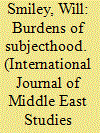

|
|
|
|
|
| Publication |
2014.
|
| Summary/Abstract |
This article analyzes the changing treaty law and practice governing the Ottoman state's attitude toward the subjects of its most important neighbor and most inveterate rival: the Russian Empire. The two empires were linked by both migration and unfreedom; alongside Russian slaves forcibly brought to the sultans' domains, many others came as fugitives from serfdom and conscription. But beginning in the late 18th century, the Ottoman Empire reinforced Russian serfdom and conscription by agreeing to return fugitives, even as the same treaties undermined Ottoman forced labor by mandating the return of Russian slaves. Drawing extensively on Ottoman archival sources, this article argues that the resulting interimperial regulations on unfreedom and movement hardened the empires' human and geographic boundaries, so that for many Russian subjects, foreign subjecthood under treaty law was not a privilege, but a liability.
|
|
|
|
|
|
|
|
|
|
|
|
|
|
|
|
| 2 |
ID:
130590
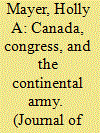

|
|
|
|
|
| Publication |
2014.
|
| Summary/Abstract |
Between 1774 and 1776 American rebels feared the British government would use French Catholic Canadians to contain their insurrection. As the empire advanced incorporation of its new subjects through the Quebec Act, the Continental Congress invited them to join its fellowship and invaded Canada to secure its cause. The invitations required that the rebels broaden definitions of civil, specifically religious, liberties, whereas enlistment of some Canadians challenged the Continental Army to practice what Congress proclaimed. Recruiting Catholic Francophone "others" by Protestant Anglophones as a strategy of war and nation building tested ideologies within the military sphere; the results reveal a precarious fit between developing public policy, military exigencies, and older biases
|
|
|
|
|
|
|
|
|
|
|
|
|
|
|
|
| 3 |
ID:
132968
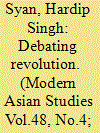

|
|
|
|
|
| Publication |
2014.
|
| Summary/Abstract |
This paper examines the public debate that happened among Delhi's Sikh community following the formation of the Khalsa by Guru Gobind Singh. The detail of this debate was expressed in the early eighteenth century Sikh text, Sri Gur Sobha. The Sri Gur Sobha explains how Delhi's Sikhs became divided into pro-Khalsa and anti-Khalsa factions, and how this conflict resulted in a campaign of persecution against Delhi's Khalsa Sikhs. In this paper I endeavour to analyse exactly why this dispute occurred and how it reflects wider political and socio-economic processes in early modern India and Sikh society. In addition, the paper will explore how the elite Khatri community consequently became an object of hatred in eighteenth century Khalsa Sikh literature.
|
|
|
|
|
|
|
|
|
|
|
|
|
|
|
|
| 4 |
ID:
133820


|
|
|
|
|
| Publication |
2014.
|
| Summary/Abstract |
Eli Teremaxi's Serfa Kurmancî has not yet received the critical attention it deserves. It was dismissed by Auguste Jaba as a text of "minor interest," but in fact it is of paramount importance both for the study of the Kurdish language and for the history of Kurdish learning. Not only does it contain the oldest extant detailed remarks on Kurdish grammar, in all likelihood preceding even Garzoni's 1787 Grammatica; it is also among the first examples of Kurdish-language prose writing. The rise of prose texts of learning in Kurdish in the eighteenth century is an aspect of so-called "vernacularization," i.e. the use of a vernacular language for new purposes of written literature and learning. Vernacularization is, this article argues, a crucial prerequisite for the rise of a national language. The article also briefly discusses traces of a similar development in some of Teremaxî's near-contemporaries.
|
|
|
|
|
|
|
|
|
|
|
|
|
|
|
|
| 5 |
ID:
001174


|
|
|
|
|
| Publication |
Westport, Greenwood Press, 1998.
|
| Description |
x, 215p.Hbk
|
| Standard Number |
0313240796
|
|
|
|
|
|
|
|
|
|
|
|
Copies: C:1/I:0,R:0,Q:0
Circulation
| Accession# | Call# | Current Location | Status | Policy | Location |
| 040730 | 909.7/THA 040730 | Main | On Shelf | General | |
|
|
|
|
| 6 |
ID:
130591
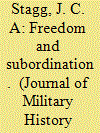

|
|
|
|
|
| Publication |
2014.
|
| Summary/Abstract |
This essay examines the general court martial case files for enlisted men in the War of 1812. The defendants were a reasonably representative cross section of the enlisted men, desertion was the most frequent offense, and mistreatment by officers was the most common motive for deserting. Most defendants proclaimed their innocence, but guilt and conviction were invariably the outcome in their trials. Officers struggled to find effective punishments. The abolition of corporal punishment by the lash in 1812 reduced the army's disciplinary options, resulting in an increasing recourse to the death penalty. The army, however, shrank from executing all the condemned.
|
|
|
|
|
|
|
|
|
|
|
|
|
|
|
|
| 7 |
ID:
124287


|
|
|
|
|
| Publication |
2013.
|
| Summary/Abstract |
In 1860 Henry Hennessy wrote that "if no great continents existed, but a great number of islands without any remarkble preponderance of land towards the tropical or polar regions, the mean temparature of the earth would be increased, and the distribution of heat over its surface rendered for more uniform."
|
|
|
|
|
|
|
|
|
|
|
|
|
|
|
|
| 8 |
ID:
131448
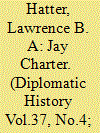

|
|
|
|
|
| Publication |
2013.
|
| Summary/Abstract |
This article reinterprets the Jay treaty by taking seriously the Republican criticism of the treaty's western provisions, which created a porous border between the United States and British-Canada. It argues that Laurentine merchants-entrepreneurs interested in the trade of the extended St. Lawrence River valley-used the Jay treaty as a charter, protecting their commercial and political rights as British subjects residing and trading in the United States. By exploring the conflicts between Laurentine merchants and federal officials over the terms of the Jay charter, this article opens a window on the complex process of state formation in the Anglo-American borderland between 1796 and 1819. It argues that state formation involved a wide array of activities and innovations at both the center and the periphery. More specifically, the article points to the important role that diplomacy, Republican commercial policy, and legal definitions of citizenship played in the creation of an American national state.
|
|
|
|
|
|
|
|
|
|
|
|
|
|
|
|
| 9 |
ID:
124471
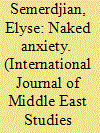

|
|
|
|
|
| Publication |
2013.
|
| Summary/Abstract |
In the 18th century, non-Muslims and women crossed social boundaries during a period of increased global consumption, prompting intervention on the part of Ottoman officials. On the imperial level, the sultan promulgated edicts to restrict such crossings, following the path of earlier laws that had regulated public spaces including bathhouses. In Aleppo, a local reflection of these 18th-century trends was increased monitoring of nudity and of contact between Muslims and non-Muslims within the city's bathhouses. Regulations required that bathkeepers provide separate bath sundries for Muslims and non-Muslims and prohibited co-confessional bathing for women in particular. With the assistance of guilds-and to a lesser extent millet representatives-complex bathing schedules for Muslim and non-Muslim women were registered at court to support segregation policies. Jurists discussing modesty requirements for Muslim women declared that non-Muslim (dhimm?) women were to be treated as unrelated men in that they were forbidden to gaze upon a naked Muslim woman. Shari?a court rulings were constructed along similar lines, indicating that the dhimm? woman was an unstable, liminal social category because in some circumstances her gaze was gendered male. Muslim male elites and local guilds ultimately instituted segregated bathing schedules to protect the purity of Muslim women from the danger posed by the dhimm? female figure.
|
|
|
|
|
|
|
|
|
|
|
|
|
|
|
|
| 10 |
ID:
131534
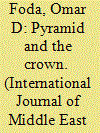

|
|
|
|
|
| Publication |
2014.
|
| Summary/Abstract |
This paper focuses on a long-running and understudied Egyptian economic institution, the beer industry. While the presence of a well-developed beer industry in a predominantly Muslim country is noteworthy in itself, it is the consistent profitability of this industry despite the vicissitudes of Egypt's economic and political development that have made it truly remarkable. Relying heavily on archival material, including documents preserved in Cairo's Dar al-Watha?iq (Egyptian National Archives), this paper tracks the development of the beer industry in Egypt from 1897, when Belgian entrepreneurs started the Pyramid and Crown breweries, to the 1960s, when the Egyptian government nationalized the two companies. This analysis uses the history of the beer company to map larger social and economic trends in the colonial and semicolonial Egyptian economy (1882-1963) and to further problematize the foreign/Egyptian dichotomy that shapes discussions of it.
|
|
|
|
|
|
|
|
|
|
|
|
|
|
|
|
| 11 |
ID:
132745
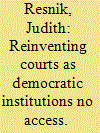

|
|
|
|
|
| Publication |
2014.
|
| Summary/Abstract |
Eighteenth-century constitutional commitments guaranteeing rights-to-remedies were shaped when members of the propertied classes were the prototypical litigants and governments' criminal justice systems were nascent. Twentieth-century egalitarian norms expanded the imagination of what justice could produce, and courts turned into sites of democracy. The particular and peculiar practices of adjudication produce, redistribute, and curb power among disputants who disagree in public about the import of legal rights. But new procedures-alternative dispute resolution (ADR)-encourage, and sometimes require, disputants to mediate or to arbitrate disputes privately as a predicate to or in lieu of using the public forum of courts. Some initiatives delegate adjudication to administrative tribunals, and others outsource binding decision-making to private providers. The resulting fragmentation and privatization of adjudication have profound implications for the newly minted democratic character of courts. The durability of courts as active and disciplined sites of public exchange ought not to be taken for granted. Like other venerable institutions of the eighteenth century-such as the postal service and the press, which served in parallel fashion to disseminate information and support democratic competency-courts are vulnerable.
|
|
|
|
|
|
|
|
|
|
|
|
|
|
|
|
|
|
|
|
|